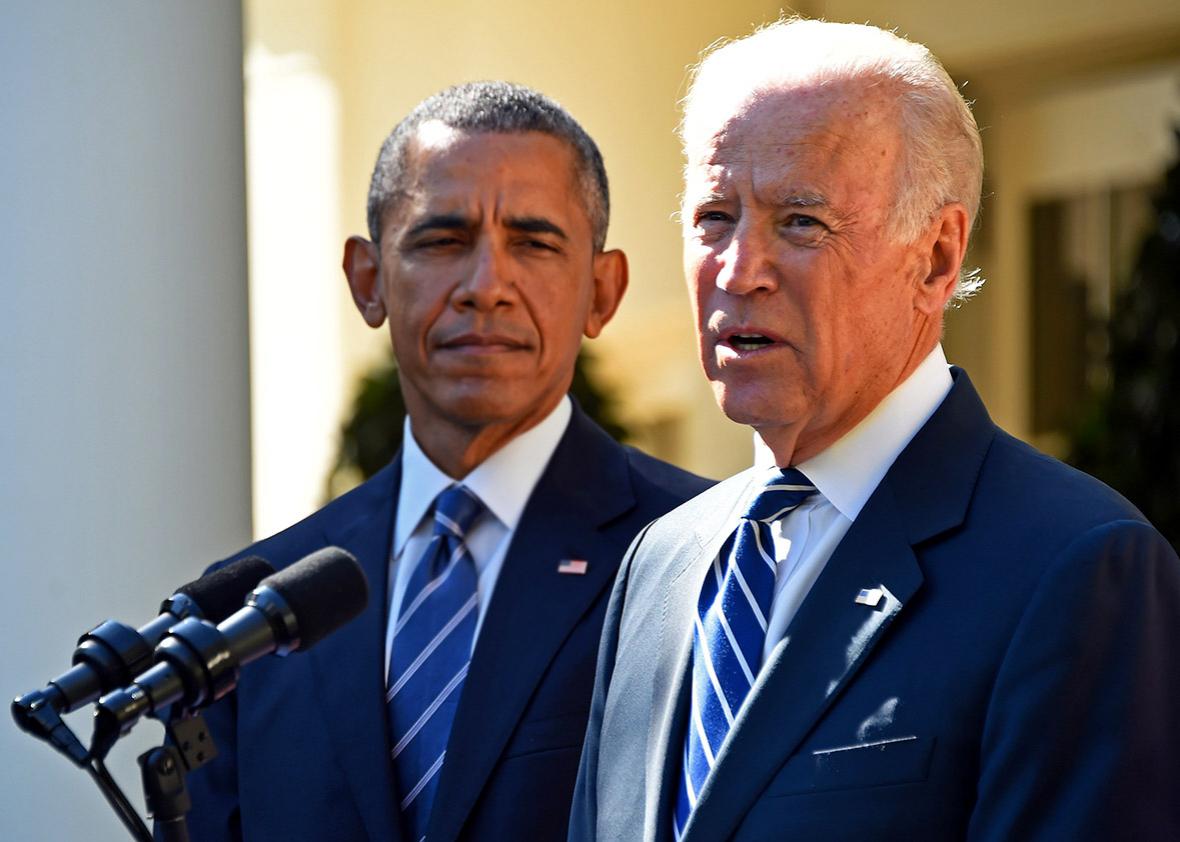For three months, Washington has wondered: Will Joe Biden run for president?
On Wednesday, Biden answered no. “As my family and I have worked through the grieving process … I’ve said time and again that it may very well be that the process, by the time we get through it, closes the window on mounting a realistic campaign for president,” said the vice president in an address in the White House Rose Garden with his wife, Dr. Jill Biden, and President Obama. “I’ve concluded, it has closed.”
His announcement follows days of speculation from pundits, and rhetoric—from the vice president—that struck a critical note on Hillary Clinton, the Democratic front-runner. On Tuesday, for instance, he made a quip at Clinton’s expense while speaking at an event honoring former Sen. Walter Mondale. “I really respect the members up there, and I still have a lot of Republican friends. I don’t think my chief enemy is the Republican Party. This is a matter of making things work.” And on the subject of Clinton’s tenure as secretary of state, he made this comment. “I will get sent to go to speak with Putin or speak to Erdogan or go speak to whomever and it’s because the secretary of state—and we’ve had two great secretaries of state—but when I go they know that I’m speaking for the president,” he said.
Biden isn’t thrilled with Clinton, but he isn’t going to challenge her. And for good reason: He’d lose. For all the attention on Biden’s quantum campaign, there was never a case for his candidacy. Even with bad news, a slow summer, and Sen. Bernie Sanders, Hillary was dominant in the Democratic field. With two exceptions—a CNN survey from early September and a Bloomberg one from the end of that month—Clinton never dropped below 40 percent in national polls of the Democratic race. Anticipating a campaign, pollsters have asked voters to rank Biden with Clinton, Sanders, Martin O’Malley, Jim Webb, and Lincoln Chafee. In these polls, Clinton scores a high plurality—or occasionally a majority—of the vote.
Of course, there’s an easy retort—Clinton was ahead in 2007 too, before Barack Obama caught fire. And it’s true: Polls, even at this stage, aren’t predictive. With the right campaign, the argument goes, Biden could have won.
But this ignores a whole host of facts that make 2016 a different election than the 2008 race. This Clinton, unlike her previous self, has broad support from a cross section of the Democratic Party. She has more than 100 endorsements from national Democratic officeholders and support from key members of the Obama campaign teams of 2008 and 2012. And to that point, Joe Biden isn’t Barack Obama. He can’t make a generational contrast, he can’t claim history, and on key issues—like criminal justice, where he authored the 1994 crime bill—he can’t run to Clinton’s left. An exceptionally skilled politician could overcome this, but that’s not Biden. He’s run two campaigns for president, and both times he failed to build the kind of traction or raise the kind of money you need to win.
But while Biden isn’t running, it’s clear he wants to. More than anything, his address was a taste of the campaign he would have run.
More than Clinton, he would have run as a direct heir to the Obama legacy. “This party, our nation, will be making a tragic mistake if we walk away or attempt to undo the Obama legacy,” he said. “The American people have worked too hard, and we’ve come too far for that. Democrats should not only defend this record and protect this record, they should run on the record.”
He would have positioned himself as a fighter for middle-class interests, borrowing ideas from Clinton (greater access to child care), Sanders (“16 years of free public education”), and adding his own spin: “We can pay for all of this with one simple step: by limiting the deductions in the tax code to 28 percent of income.” He also would have hit the same notes on social justice issues, touting rights for LGBTQ Americans, immigration reform, and equal pay. And on health care, Biden would have made a cancer treatment a top priority. “If I could be anything, I would have wanted to be the president that ended cancer, because it’s possible,” he said.
His core challenge to Clinton would have echoed Obama’s from eight years prior; Biden would have pressured Clinton on national security, critiquing her zeal for intervention and military force. “We have to accept the fact that we can’t solve all the world’s problems,” he said. “The argument that we just have to do something when bad people do bad things isn’t good enough. It’s not a good enough reason for American intervention and to put our sons’ and daughters’ lives on the line, put them at risk.”
Likewise, he would have pushed unity—a new spin on “change we can believe in.” “I believe we have to end the divisive partisan politics that is ripping this country apart, and I think we can,” said Biden. “It’s mean-spirited, it’s petty, and it’s gone on for much too long.”
It’s impossible to know how this would have worked in practice. Biden might have made a splash, or he might have sparked an ugly, drawn-out fight, as the worst of his career—the war on drugs, Anita Hill—came back to the light. It’s also hard to know if Democrats are helped or hurt by his decision.
As it stands, this—the vice presidency—is Biden’s last gig in politics. And he’ll finish the job in better shape than most.
